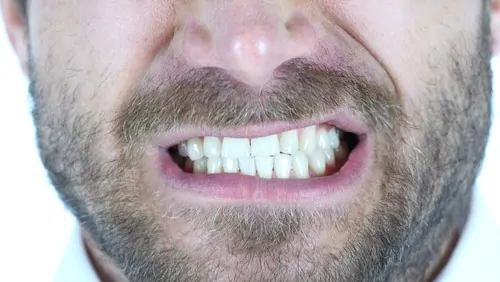What Causes Receding Gums?

If you have gum pain, swollen gums, or increased tooth sensitivity, particularly along the gum line, you may be experiencing gum recession. This oral health problem can lead to other issues down the road, including increased tooth decay, sensitive teeth, and even tooth loss. So what exactly causes receding gums, and how is it treated? Your dentist in Douglasville is here to help.
Gum Recession: 101
Let’s first dive into what gum recession is so we can better understand how it affects oral health, what can cause it, and how it’s treated. Gum recession occurs when gum tissue starts to pull away from teeth, exposing teeth roots. Without this protection covering the roots and the inner workings of the teeth, it’s highly likely that tooth sensitivity will increase. Additionally, teeth are at greater risk for decay, cavities, and eventual tooth loss. But that’s not all. Once gum tissue is gone, it’s gone, and there’s no growing it back. However, your dentist may have treatment options available to help with gum recession.
Gum Recession Causes
There are a whole host of things that can cause gums to recede, and the cause can vary from person to person and include:
- Gum Disease
- Brushing Your Teeth Too Hard
- Grinding and Clenching
- Trauma
It’s best to talk with your dentist in Douglasville to determine the main cause of your specific case so they can recommend the best gum recession treatment for you.
Treating Gum Recession
Just like there is no singular cause of gum recession, there’s also no singular treatment that’s right for everyone. Your treatment plan will be custom created just for you based on how severe your recession is. Treatment options can include:
- Scaling & Root Planing: The most common type of gum recession treatment is done right in your dentist’s office and is called scaling and root planing. This procedure is similar to a dental cleaning, but the difference is both the tooth and the roots are cleaned during a scaling and root planing. Scaling and root planing helps remove plaque and tartar buildup from up under the gums and from the roots of teeth. You will most likely be numbed for this treatment to help keep you comfortable and relaxed.
- Antibiotics: Another treatment option that is often paired with scaling and root planing is the use of an antibiotic. The antibiotic helps remove any bacteria that may still be hanging around.
- Surgical Treatment: More advanced gum recession may require more advanced dental treatment. Thankfully, there are several surgical techniques that dentists can use to help combat gum recession. This treatment option is not appropriate for everyone, and it’s important to note that just because you have gum recession, it doesn’t mean you’ll need surgery. The best to find out how to treat gum recession is to talk with your dentist in Douglasville.
Receding gums may sound scary, but try not to worry. Besides having several treatment options to choose from, there are also things you can do to prevent gum recession from happening in the first place, and most of them are easy. Make sure you brush and floss every day and make sure you’re brushing using a soft-bristled toothbrush and gentle, small circles. Lastly, see your dentist in Douglasville twice a year to further protect your oral health.
Does Drinking Water Benefit Oral Health?

Everyone knows that it’s important to drink plenty of water every day to keep our bodies well hydrated. In fact, this small step of drinking enough water can greatly benefit overall health. Proper hydration is important to help organs function properly, help fight off infections, and may even assist with weight loss. However, your dentist in Douglasville wants to share a few more reasons why you should choose water — and plenty of it.
Better Breath
Believe it or not, drinking water and keeping your mouth properly hydrated is one of the best ways to combat bad breath. Bad breath can often be a side effect of dry mouth, an oral health problem whose name describes it perfectly. Dry mouth may be caused by certain medications, mouth breathing, or simply not drinking enough water. While dry mouth may seem like no big deal, it’s especially concerning for your dentist in Douglasville, You see, our mouths need water to produce saliva, but when we’re dehydrated and experiencing dry mouth, saliva production slows or stops completely. That’s when problems arise. Without saliva, there is nothing to help rinse away leftover food particles or mouth bacteria that can contribute to bad breath.
Cleaner Mouth
When we choose to drink water over sugary beverages such as soda, juice, or sports drinks, we’re not only hydrating our bodies, we’re also helping our mouths stay clean in between brushings. Drinking water, especially when we’re eating, helps to rinse away food particles before they have a chance to linger around and attract bacteria. If not, bacteria will feed on the food particles and release a dangerous acidic byproduct. This acid will attack tooth enamel and leave teeth at increased risk for decay and cavities. Additionally, water is the ideal beverage of choice because it doesn’t contain any sugars. Other sugary drinks may seem to quench our thirst, but the sugars only continue to feed bacteria as opposed to removing their food source.
Stronger Teeth
Whether you drink bottled water or water from the tap, H2O is always the preferred choice for your dentist in Douglasville. However, while bottled water may provide all of the benefits of hydration, it may be missing one key ingredient that you can typically get from tap water — fluoride. Fluoride is a naturally occurring mineral that helps rebuild and remineralize tooth enamel. The process of remineralization strengthens the enamel, making it super strong and super protective against bacteria, acids, and plaque.
Overall Healthier You
Water is one of the most important things that we can give our bodies, yet an estimated 75% of adult Americans don’t drink enough water daily. Consequently, this can lead to negative overall and oral health effects. We need to reverse this habit in order to fuel and protect our bodies. But where do you start? A good rule of thumb to follow is to drink at least eight 8-ounce glasses of water every day, more if you exercise or sweat, and more especially during these summer months.
Why Men Are at Increased Risk for Oral Health Problems

Every June is recognized as Men’s Health Month and strives to bring awareness to just how important it is for men to keep up with doctor appointments, physicals, and routine procedures based on age. It’s also a time for your dentist in Douglasville to encourage all men to seek regular dental care. After all, men are less likely than women to see the dentist regularly as well as keep up with routine doctor visits, both of which can protect their overall health and wellbeing.
Prevention is Key
Your dentist in Douglasville knows just how important it is to get a dental checkup at least every six months. These visits are crucial to monitoring oral health as well as giving each and every patient a professional cleaning that helps remove stuff from your teeth and gums that you simply can’t touch at home. However, according to the Academy of General Dentistry, men are less likely to schedule and complete these preventive appointments and instead only see the dentist when they’re experiencing a problem. For this reason alone, men are at increased risk for oral health problems, some of which can be pretty serious and include:
- Gum Disease. Gum disease is a serious infection that occurs in the gum tissue of the mouth. If not treated quickly and effectively, it can lead to tooth loss and a whole host of other whole-body problems. In fact, numerous studies have shown a connection between gum disease and the increased risk of heart disease, certain cancers, respiratory problems, and poor prostate health in men. Additionally, men are at greater risk of developing gum disease than women. According to The American Dental Association, around 34% of men ages 30-54 have gum disease as compared to 23% of women in the same age range.
- Oral Cancer. Another serious oral health condition that tends to affect men more than women is oral cancer. Oral cancer can occur in any of the soft tissues in the mouth, including lips, tongue, and cheeks, as well as in the throat. Men are two times more likely to get oral cancer than women and four times more likely to develop oropharyngeal cancer, cancer that affects the way back of the mouth. It can be treated with early intervention, but when it’s not caught early, it can spread to other areas of the body and may lead to death. This is just another reason why seeing your dentist in Douglasville every six months can help protect your overall health.
- The Need for Advanced Dental Care. Since men tend to avoid preventive dental appointments, they’re at increased risk for the need for advanced dental care. Just like most things in life, when a dental problem is left untreated, the solution is often more complicated than it would have been if caught earlier. What may have been a small area of decay a few months ago may now be a deep cavity, and the treatment can vary greatly. In the early stages, decay can usually be treated with a minor filling. However, if the decay infects too much of the tooth it may require a root canal and perhaps a dental crown. If decay is left alone for even longer, it may cause pain and require a tooth extraction, which should then be replaced with a dental implant or dental bridge. So while preventive dental appointments may seem unnecessary, if nothing is wrong, there can be problems lurking just below the surface that can be fixed immediately and easily before they cause problems and require advanced dental treatment.
Lifestyle Factors Play a Role
Besides skipping out dental appointments every six months, men are also more likely to engage in lifestyle factors that also increase the risk of oral health problems such as:
- Smoking or using smokeless tobacco
- Drinking alcohol
- Having poor oral hygiene habits
While it’s important for everyone to see their dentist in Douglasville every six months, men tend to need a little extra encouragement. So for this Men’s Health Month, and every month, we invite men to break the mold and schedule an appointment. Your mouth, and your overall health, will thank you for it.
“Why Is My Tongue a Different Color?”

Usually you’ll find your dentist in Douglasville spending most of their time talking about teeth. But today, we’re switching it up a bit and focusing on another important area of oral health — the tongue. This amazing muscle helps us speak, chew, and swallow, but did you know that our tongues can also help your dental team identify oral health problems- or even other whole-body problems? Say “Ah!” and let’s take a look at some ways our tongues can be the window to overall health.
A Bright Red Tongue
Tongues are usually a nice shade of pink — this indicates a well-hydrated and healthy tongue. But there are also times when patients look in their mouths to find a bright red tongue. The color can be so dramatic that it can appear as if you just ate a red popsicle that stained your tongue. A red tongue is often referred to as strawberry tongue and can indicate a vitamin B-12 deficiency or an iron deficiency. Occasionally, a red tongue may also be a sign of a fever, strep throat, Kawasaki disease, or erythroplakia. Erythroplakia may increase the likelihood of developing oral cancer, so any tongue redness that doesn’t go away warrants a call to your dentist in Douglasville.
Scalloped or Wavy Edges
If it’s been a while since you’ve last looked at your tongue, you may now notice changes in its texture, particularly a scalloped or wavy appearance along the edges. This is usually nothing to be concerned about but can be a sign of other problems. Scalloped or wavy edges often result from the tongue being pushed up against the teeth repeatedly. This can even happen during sleep! This change in tongue texture can also be a sign of teeth grinding, sleep apnea, TMJ disorder, or vitamin deficiencies.
A Black, Hairy Tongue
As gross as this sounds and as scary as it can be, usually a black, hairy tongue isn’t anything to worry about. This condition can be caused by poor oral hygiene, smoking or chewing tobacco, drinking too much alcohol, dry mouth, or changes to yeast or bacteria in the mouth. Also, the “hair” you see isn’t actually hair but rather a buildup of skin cells on the papillae (the tiny bumps naturally found on tongues). When too many cells take over the papillae, they can appear long and hair-like as opposed to small bumps. This condition can resolve on its own.
Painful Sores or Bumps
As we’ve mentioned before, all tongues have tiny bumps called papillae. Those are normal and are no cause for concern. However, when a new bump appears and is accompanied by pain or soreness and doesn’t go away, you should visit your dentist in Douglasville. New lumps that don’t go away over the course of two weeks may be a sign of oral cancer. Oral cancer can be treated, but treatment is often more successful when the cancer is caught early. Call your dentist as soon as you can to get it checked out.
Your tongue can say a lot about your overall health, and it shouldn’t be ignored. Keep a close eye on your tongue in-between your dental appointments and be sure to talk about any changes you may notice with your dental team.
How Stress Can Affect Oral Health

Stress can be caused by any number of things, such as work and family. But in these uncertain times, it’s only natural to experience elevated levels of stress. Too much stress can have negative effects on bodies such as headaches, stomachaches, increased heart rate, and overall feelings of anxiety. But your dentist in Douglasville also wants you to know that high levels of stress can also affect your oral health. Let’s examine a few ways in which this happens, as well as what you can do to help protect yourself.
- Jaw Pain & Discomfort
Your jaw joint, or your temporomandibular joint (TMJ), is one of the main areas where stress can affect your oral health. When we’re overly stressed, we tend to have a subconscious response that causes us to clench or grind our teeth repeatedly. This constant pressure on both the teeth and jaw muscles can lead to jaw pain as well as damage to teeth. Over time, if the clenching and grinding continue, you may develop TMJ disorder. This often painful condition is usually accompanied by jaw popping or clicking or even a locked jaw. It’s best to see your dentist in Douglasville when you start experiencing these symptoms.* - Canker Sores
Many of us have experienced the discomfort of the canker sore or other similar sores in our mouths. These sores often resemble ulcers and can be white or red spots or lines. While there is no definite cause of a canker sore, studies conducted by the Academy of General Dentistry support the hypothesis that canker sores can occur more often in those who undergo prolonged periods of stress. Canker sores can be annoying and a little bit painful, but they aren’t contagious. - Gum Disease
One of the most common dental diseases that affect Americans is gum disease. Typically, the cause of gum disease is poor dental hygiene or smoking. But there have been recent studies that suggest a connection between stress and gum disease. It’s also important to know that this oral health disease doesn’t only increase the risk of problems in the mouth, such as tooth loss, it can also contribute to problems throughout the body. Gum disease has been linked to overall health conditions such as heart disease, respiratory disease, and some cancers. Some signs of gum disease include bleeding while brushing or flossing, chronic bad breath, or swollen gums. If you notice any of these, call your dentist in Douglasville.*
Reduce Your Stress, Reduce Your Risk
Reducing stress levels can go a long way in protecting both your overall health as well as your oral health. While everyone is different and stress-management techniques can vary in effectiveness from person-to-person, there are a few trusted tips health professionals recommend.
- Sleep. Getting enough sleep every night can help our bodies recover and lower stress. If you have trouble falling asleep, try to avoid blue light an hour before bed, listen to calming music or sounds, and follow a regular routine of waking up the same time every day.
- Exercise. Whether you decide to go for a walk, dust off your yoga mat, or follow a workout video, make sure you do some sort of exercise every day. Physical activity can release endorphins and can decrease stress.
- Breathe. Simply focusing on your breathing or practicing daily meditation can do wonders in lowering blood pressure as well as stress. Take a few minutes every day to focus on deep breathing exercises or try out an app that guides you through a meditation session.
During these uncertain times, we’re bound to feel stressed out occasionally. Make sure you focus on identifying when you’re feeling this way and practice lowering stress levels to help keep your body, mind, and oral health in good shape.
*At the time of publishing, the ADA recommends that all preventive dental appointments and non-emergency consultations be postponed. Please check with your local regulations.
What’s Considered a Dental Emergency?

There’s a lot of uncertainty in the world today, including whether or not you should see your dentist in Douglasville. We’re here to help. As of April 1, 2020, the American Dental Association (ADA) has recommended that dentists across the country suspend all routine dental care to help reduce the spread of COVID-19 until at least April 30th. However, dentists may still be seeing patients who are experiencing dental emergencies. But what, exactly, is considered a dental emergency?
Defining Dental Emergencies
The ADA defines dental emergencies as “potentially life-threatening and require immediate treatment to stop ongoing tissue bleeding [or to] alleviate severe pain or infection.” Some signs indicating that you may be experiencing a dental emergency include:
- Bleeding that doesn’t stop
- Pain or swelling in or around your mouth
- Tooth or jaw pain
- Broken or knocked-out tooth
- Gum infection with pain and swelling
The ADA also lists “urgent” dental care as a secondary set of symptoms that may require early intervention by a dentist. Dental problems that are classified as urgent include:
- Severe dental pain caused by pulpal inflammation
- Third-molar pain
- Tooth fractures with pain or resulting in soft tissue trauma
- Post-op complications such as dry socket
- Abscess or localized bacterial infection with swelling
- Dental trauma that results in a lost tooth
- Lost or broken temporary restoration or if a restoration is irritating the gum tissue
- Cavities or decay that cause pain
It’s important to note that these lists do not include every possible situation of a dental emergency or urgent dental need. The best thing to do if you think you’re experiencing a dental emergency is to call your dentist in Douglasville to determine the best course of action.
What Can Wait?
There are several types of dental treatments that are not considered emergencies and should not warrant an immediate visit to the dental office. Non-emergency dental care includes, but is not limited to:
- Routine exams, cleanings, x-rays
- Cosmetic dentistry consultations or pre-scheduled treatments such as whitening
- Cavities that do not cause pain
- Extraction of teeth that are not painful
We understand that postponing your routine dental appointments may not be ideal, and while we’d love to see you, please help us and our entire community stay safe by staying at home.
*Please note, COVID-19 recommendations change regularly. Please refer to your local government for the most recent updates regarding dental care during this time.
3 Ways to Wear Off Novocaine

You know the feeling — you just had your appointment, and your dentist in Douglasville used novocaine to help make your treatment more comfortable. But now that you’re out of the chair and back at work, you can’t talk correctly, every time you take a sip of water it drips down your face, and you certainly can’t smile fully when half of your face is numb. Don’t worry, there are a few ways you can make the effects of novocaine wear off fast.
How Does Novocaine Work?
Before we understand how to reverse the numbness of novocaine, we need to know what it is and how it works. Novocaine is a local anesthetic that eases pain around the areas where it’s administered. While the chemistry behind novocaine is complex, the basics are easy to understand. Novocaine essentially blocks your nerves from sending pain signals to the brain, therefore making treatment comfortable and virtually pain-free. Your dentist in Douglasville may use novocaine prior to dental treatments such as:
- Fillings
- Root canals
- Extractions
- Cosmetic dentistry procedures
How Long Does Novocaine Usually Last?
This is a tough question to answer as the effects of novocaine can vary in duration based on how much your dentist uses for your specific body and procedure. Usually, novocaine will numb your tooth for about 1-2 hours. But that doesn’t mean the numbness immediately subsidies after that. The effects of novocaine can last for 3-5 more hours after you leave the dental office.
How to Wear Off Novocaine Faster
Don’t have an additional 3-5 hours to wait until you regain feeling in your lips and face? There are things you can do to help make the numbness wear off faster.
- Massage the Area. If your procedure wasn’t serious and you aren’t experiencing any pain or swelling, you can try gently massaging the area to increase blood flow. More blood into the affected area can help bring feeling back quickly. However, you should avoid touching the actual injection site or the treatment area directly, and you should always wash your hands prior to touching your lips, mouth, or face.
- Do Something Physical. Similarly to massage, getting your blood pumping by doing some physical activity can also help the numbness disappear faster. You can take a walk, hop on a bike, or perhaps even go for a run. Whatever your exercise of choice is, make sure you get your dentist’s approval before you jump into strenuous activity.
- Apply a Warm Compress. Applying heat to any part of our bodies will also increase blood flow, again perhaps helping novocaine wear off faster.
Other Novocaine Side Effects
While other side effects of novocaine are rare, they are possible and include:
- Dizziness
- Headaches
- Minor injection site pain
- Muscle twitching
If you experience these side effects, talk with your dentist in Douglasville prior to receiving novocaine.
Novocaine is an incredibly common part of routine dental work and truly helps make treatments easier and more comfortable for you. If you have questions or concerns about novocaine, never hesitate to ask your dental team. After all, we are here to help you get the care you need while keeping you comfortable every step of the way.
Bad Breath & The Keto Diet

One of the most popular weight-loss diets today is the Keto Diet. Many people find it to be effective and watch the pounds drop off. But what does this have to do with dentistry, and why is your dentist in Douglasville talking about a weight loss diet? The truth is, what we eat affects our oral health, and the Keto Diet is no exception. In fact, many Keto Dieters notice a change in their breath after following the program. Let’s take a deeper look at why this happens.
The Science Behind The Keto Diet
Before we can understand why some people on the Keto Diet get bad breath, we need to understand how the Keto Diet works. The Keto Diet encourages increased consumption of high-fat foods and the decrease of carbohydrates. When carbs break down during digestion they produce glucose, which is the body’s preferred energy source. However, when there are no carbs to create glucose, the body burns fat instead, hence the weight loss. But when the body burns fat, it gives off three ketones called acetoacetate, beta-hydroxybutyrate, and acetone. The acetone is what causes bad breath.
Acetone
Acetone is a byproduct that occurs when our bodies burn fat. And it smells. But since the body can’t use acetone to store energy, our bodies get rid of it through urination or the lungs. When acetone is released through the lungs, its odor comes out as bad breath, also known as halitosis. But there’s good news — the longer someone is on the Keto Diet the more likely it is that they will become “keto-adapted,” which means your body adjusts to the diet and the bad breath goes away. In the meantime, you can fight off bad breath by practicing good oral hygiene such as brushing your teeth twice a day, flossing daily, and seeing your dentist in Douglasville every six months.
How the Keto Diet Can Help Your Teeth
Even though the Keto Diet commonly causes bad breath, there are actually some oral health benefits associated with it. Since carbs contain a lot of sugar, which everyone knows is bad for teeth, decreasing the number of carbs you eat also limits your teeth’s exposure to damaging sugars. When we eat foods with high sugar content, our mouth bacteria feed on the sugars. As a byproduct, these bacteria release acid. This acid is the main culprit to decay and cavities. In fact, some research shows that limiting the number of carbohydrates can lower the likelihood of cavities and even gum disease by more than 50%.
Talk to Your Doctor
Despite the fact that the Keto Diet can help people lose weight and may also protect teeth against cavities, the truth is, like all diets, it may not be beneficial for everyone. Before starting a diet, talk with your doctor and even consider talking with your dentist in Douglasville. After all, what we eat not only affects our overall health, it also affects our oral health. Advice and input from both your physician and your dentist can help you find the diet that’s best for you.
Why Does My Breath Stink?

- Dry Mouth.
Dry mouth is an annoying problem that many patients quickly dismiss. However, your dentist in Douglasville will be the first to tell you that a dry mouth can lead to a whole host of problems, including bad breath. In a normal, moist mouth, saliva works hard to help neutralize and rinse away acid and bacteria which helps protect your teeth against decay. But when there’s not enough saliva, the mouth can feel dry, bacteria and acid quickly build up, both of which can directly cause decay as well as give off an unpleasant odor.
- What You Can Do for Dry Mouth
Dry mouth can be caused by medications, or it could also be hereditary. Treatment would vary depending on the cause of your dry mouth, but the easiest way to help is to make sure to drink plenty of water every day. Keeping your mouth hydrated is an important step in keeping it healthy. If you suspect medications are causing dry mouth and bad breath, talk with your doctor about other potential solutions.
- Poor Oral Hygiene.
When we don’t practice a good oral hygiene routine of brushing and flossing every day, leftover food particles are left behind in our mouths and wedged in between teeth. These food particles fuel mouth bacteria and the combination of foodstuffs and bacteria can release a funky stench. Proper oral hygiene is important for everyone, but those who wear dentures may be at increased risk for bad breath if dentures aren’t cleaned regularly.
- How to Practice Good Oral Hygiene
The best way to protect your breath from the dangers of bacteria is to remove it by brushing and flossing. Make sure to brush your teeth twice a day for at least two minutes and floss at least once a day to remove food particles and bacteria that have built up throughout the day. Of course, seeing your dentist in Douglasville every six months will also help keep your teeth and breath fresh and clean.
- Gum Disease.
Perhaps the most concerning cause of bad breath is gum disease. Gum disease, also known as periodontal disease, causes deep gum pockets where food and bacteria can easily hide, making them very difficult to remove through regular brushing and flossing. The result is not just bad breath – untreated gum disease has also been linked to increased risk of stroke, heart disease, respiratory complications, and tooth loss.
- How to Combat Gum Disease:
The best way to prevent gum disease and the bad breath that goes with it is again to follow a proper oral hygiene routine and see your dentist regularly. If gum disease is untreated it will get to a point where you will not be able to reverse it.
Nobody should have to live with the embarrassment of bad breath, and it shouldn’t be taken lightly. See your dentist as soon as possible if you notice chronic, recurring bad breath.
How Can Oral Health Affect Heart Health?

Every February seems to bring out the love in people, and there are hearts everywhere we look. From heart candy and heart decorations, we’re surrounded by bright, red hearts. But we’re not here to talk about those kinds of hearts. Today, we want to focus on your heart and how your oral health can actually affect heart health.
Heart Health Month
Another holiday that happens in February besides Valentine’s Day is one that’s really important to your dentist in Douglasville. It’s Heart Health Month, which strives to raise awareness of what increases our risk of developing heart disease and what we can do to help lower that risk. But what does this have to do with your dentist? We’re glad you asked.
The Connection Between Oral Health & Heart Health
When we talk about oral health as it relates to heart health, we want to put the focus on gum disease. Even though gum disease is an infection that originates in the mouth, it doesn’t mean that it can’t affect other areas of the body. The truth is, gum disease has been linked to a whole list of health concerns outside of the mouth including diabetic complications, lung conditions, and heart disease. In fact, according to the Academy of General Dentistry (AGD), people with gum disease are at increased risk for a heart attack. But how does an infection in the mouth cause problems elsewhere in the body?
As it turns out, our gums have a direct connection to our bloodstream, and when an infection occurs in our gums, it can also easily enter the bloodstream. When this happens, your body produces too much of something called C-Reactive Protein (CRP). Higher than normal levels of CRP can cause:
- inflamed arteries
- blood clots
- heart attacks
- strokes
Elevated CRP levels can also be a warning sign before you may even know a problem is lurking in your body. The New England Journal of Medicine states that high CRP levels may be a top indicator of someone’s risk of a heart attack — more so than high cholesterol!
Know the Signs to Protect Yourself
Oftentimes symptoms of gum disease go unnoticed or people think they’re normal. However, being able to recognize when there may be a problem can mean the difference between successful treatment and bigger problems. Some common symptoms of gum disease include:
- Swollen, red, or tender gums
- Bleeding while brushing or flossing
- Consistently bad breath
- Chronic bad taste in the mouth
- Loose teeth
- Gums that appear to be pulling away from the teeth
If you’re experiencing any of these symptoms, schedule an appointment with your dentist in Douglasville as soon as you can.
The best way to protect yourself against gum disease is to make sure you brush and floss your teeth every single day. Proper at-home oral hygiene will remove plaque and bacteria buildup before it has a chance to infect the gums. It’s also crucial to maintain regular checkups with your dentist in Douglasville at least every six months. Not only do these appointments help remove buildup that regular brushing just can’t get, but they also help your dental team keep an eye on your oral health so any problems are caught and treated early before they have a chance to affect the rest of the body.



